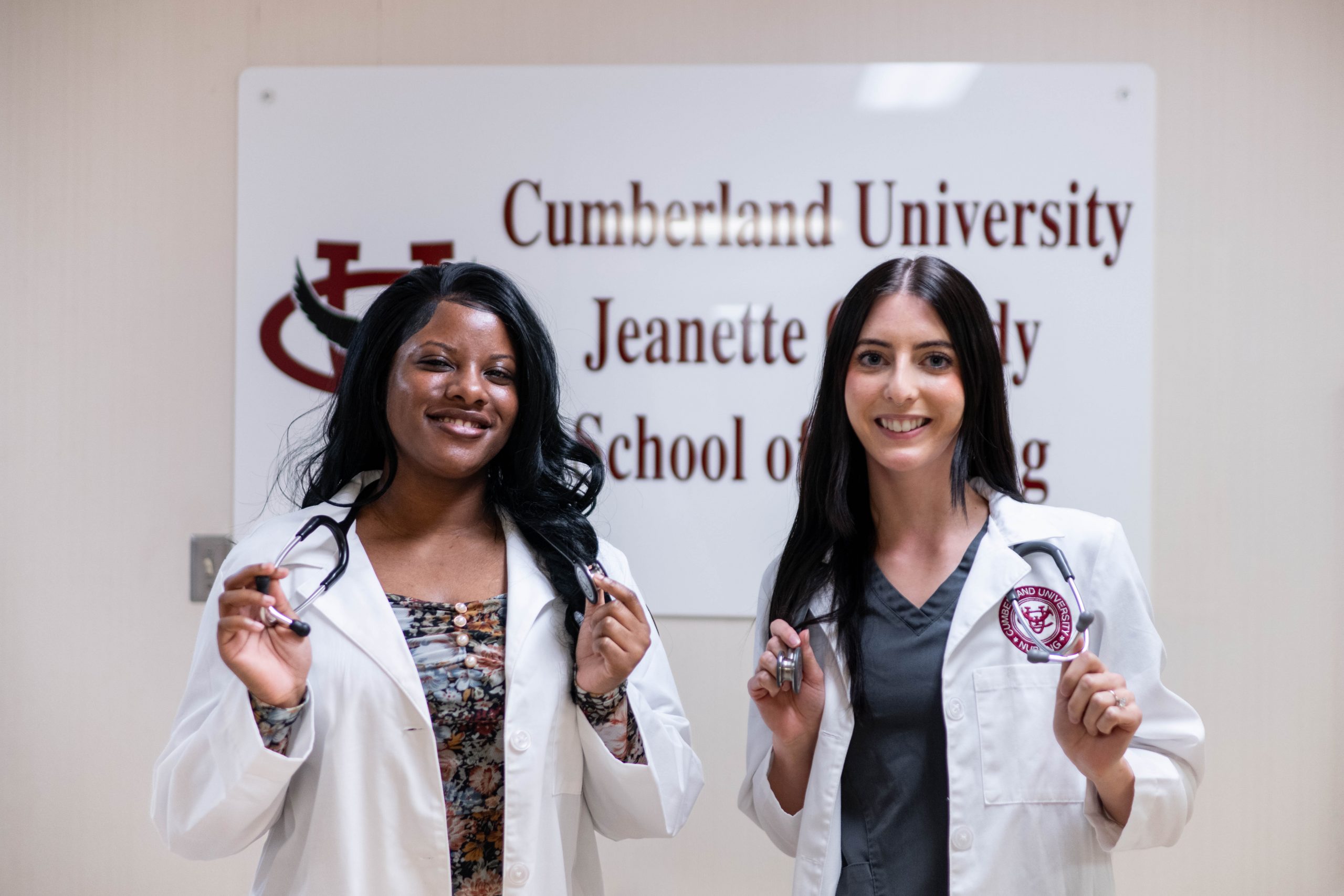About
Thank you for your interest in Cumberland University’s nursing programs. The Jeanette C. Rudy School of Nursing seeks candidates who will bring the qualities of: scholarship, caring, resilience, integrity, collaboration, service, passion, vision, excellence, professionalism, motivation, commitment and excellence to the profession of nursing.
We take pride in our nursing programs, and hope you find a great fit with us and find our programs suitable to your educational needs.
Undergraduate Nursing Program Options

BSN
This program is recommended for students who are interested making a positive impact on the health of their community and being part of the most trusted profession in America.

LPN to BSN
Courses in this program will supplement what LPNs have learned in the field in preparation for a career as an RN. As a stuent, you will begin taking nursing courses in the first semester at the same time you are taking prerequisite classes.
Guaranteed Nursing Admissions (GNA)
Fall Application Deadline: March 1
Spring Application Deadline: October 1
Freshmen who meet the qualifications for Guaranteed Nursing Admissions will be guaranteed a seat in the Rudy School’s Nursing program entering their junior year, if they continue to meet requirements for admission.
Eligibility
- Must be incoming First-Time Freshman, enrolled full-time
- 25 or above ACT composite score or Super Score
- Cumulative High School GPA of a 3.5 on a 4.0 scale
- Students may apply during their Senior year of high school or during their first two semesters enrolled at CU
*Prior to completing an application for Guaranteed Nursing Admissions (GNA), applicants must have first applied for general admission to the university.
Continuing Eligibility
After a student is granted Guaranteed Nursing Admission, the student must maintain the following to ensure their good standing:
- A cumulative 3.0 GPA while in the Pre-Nursing Program
- Obtain a grade of “B” or above in Chem 103, Bio 213 & 214, Math 111 or 110 (Course retakes are eligible for GNA)
- Maintain a full-time status
Graduate Nursing Programs
Teaching-Learning Facility
The nursing program is housed in McFarland Hall, (500 Park Avenue, Lebanon TN) which was previously a wing and the intensive care unit (ICU) of McFarland Hospital. The space is leased from Vanderbilt Wilson County Hospital, which owns the facility. One wing and the previous ICU of the hospital has been converted into teaching facilities for Cumberland University including faculty offices, classrooms, clinical practice laboratories and a simulation laboratory, while a portion of the hospital remains functional.
The facility is located approximately one mile from the main campus. For hands-on clinical practice, students will travel to healthcare facilities as well as other learning sites within a 65-mile radius of McFarland Hall. We do not allow students to pick their own clinical assignments, but we will work around any approved University related activities.
-
BSN Mission
The mission of the Jeanette C. Rudy Nursing Program is to prepare caring and competent graduates who will provide excellent evidence-based nursing care for individuals, families, and communities across the lifespan. Emphasis will be placed on knowledge, skills, attitudes, and experiences that promote clinical reasoning, clinical judgment, integrity, and life-long learning.
-
MSN Mission
The mission of the Master of Science in Nursing program is to build upon the undergraduate Bachelor of Science in Nursing degree to educate and empower the professional nurse for leadership that is adaptable in a rapidly changing, complex healthcare environment and allows them to function as a change agent in healthcare, education, and organizational system through an evidence-based curriculum leading to a concentration in Nursing Education or Nurse Executive Leadership and Administration.
-
Our History
Cumberland University’s response to meeting the needs in Middle Tennessee for well-educated and well-prepared nurses began several decades ago. The BSN nursing program began accepting students in 1992. This was made possible by many facilities, organizations and individuals in Middle Tennessee who contributed money for start-up, scholarships, equipment and supplies.
In the spring of 2004, the school’s name was changed to honor one of those generous individuals. The school was named the “Jeanette C. Rudy School of Nursing” to honor the generosity of Dr. Jeanette Cantrell Rudy, retired nurse and philanthropist. Today, the program is growing exponentially and successfully and offers the traditional BSN, an RN to BSN and a Masters of Science in Nursing (Educator track or Leadership track).
-
Philosophy
The School of Nursing (SON) faculty believes the B.S.N. degree is the minimum level of educational preparation for professional nurses. The faculty also believes that nursing education should be based in the liberal arts and sciences with the majority of non-nursing education courses placed at the general core level. In keeping with these beliefs, the majority of the School of Nursing course hours are in nursing science. Nursing science courses are constructed to develop the student through the integration of nursing knowledge and knowledge from the humanities and the social and natural sciences.
The faculty of the SON believes that nursing education must be individualized to meet the learning needs of each student. The SON faculty also believes that innovative and flexible means of entering the program should be available. As a result, the SON admits students into the School of Nursing on either a part-time or full-time basis, as fully or provisionally admitted students.
The SON faculty believes the educational concepts; “transfer of learning” and “critical thinking” are more valuable than rote memorization. Because the world of nursing is evolving and rapidly changing, it is important that students learn to transfer knowledge from one situation to another, while making decisions based on critical thinking specific to that situation. The SON provides nursing education that is based in practice, thus giving students an opportunity to transfer theoretical knowledge into clinical learning experiences. Faculty are committed to preparing each student so that they become practicing graduates who contribute to nursing as competent and caring professionals.


